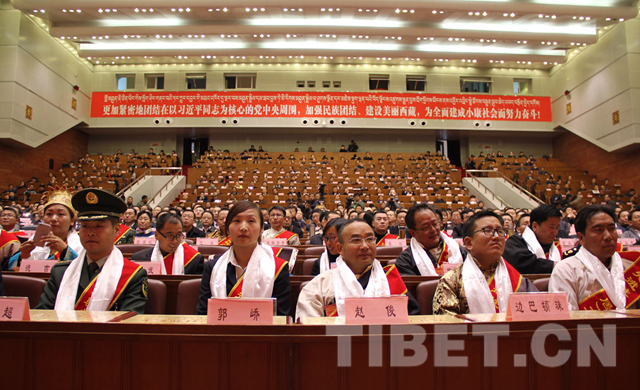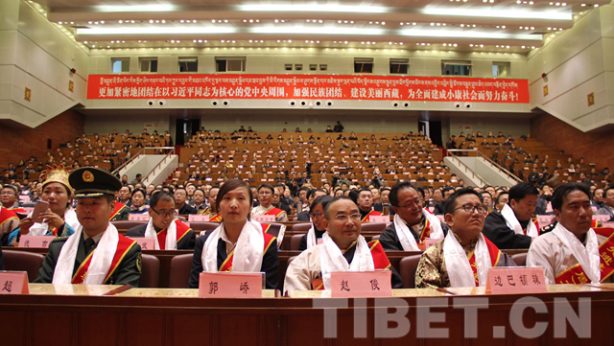China extends Tibet surveillance program for sixth year in row

Official Chinese media recently reported on a conference held on 25 November in Lhasa where the sixth batch of “village-based cadre teams” (Ch: zhucun gongzuodui) was announced and awards were presented to cadres in the previous fifth batch for ‘outstanding achievement’ in TAR. In the sixth batch of ‘village-based cadres’, a total of 22000 party and government cadres have been selected out of which 2408 provincial-level cadres along with 55 prefectural-level cadres will lead and direct the rest of the cadres. All of the cadres will be stationed in 5467 villages and neighbourhood committees, including also the religious institutions in TAR.
Since October 2011, Chinese authorities have sent tens of thousands of government and party cadres to grassroots Tibetan communities in an effort to ‘nip in the bud’ any signs of dissent and criticism against the party-state and to prevent a repeat of the 2008 Tibetan uprising. Despite claims from Chinese government that these cadres are engaged in improving the living conditions of the Tibetan communities under the so-called ‘Solidify the Foundation, Benefit the Masses’ (Ch: qianji huimin) campaign, the actual implementation of this program leaves little doubt that it is just one of the many monitoring and surveillance campaigns being implemented in Tibet.
The village-based surveillance program, first implemented in October 2011, was to last for three years. However, in a December 2014 announcement from the TAR authorities confirmed that the program will be extended indefinitely in order “to consolidate and expand the excellent initial results”. This indicates that surveillance will become a routine and unavoidable part of everyday life in TAR, in addition to the fact that basic human rights and fundamental freedoms are already suppressed by the party-state known for its extreme hostility and suspicion of the human rights system.
“This surveillance program implemented since 2011 has proven to be highly repressive and terrifyingly intrusive because it involves cadres acting as thought police keeping a regular watch on local Tibetans. The cadres arbitrarily visit the homes of local Tibetans to gather political information and force them to attend political indoctrination sessions. Tibetans have to accommodate them or risk getting blacklisted,” said Tenzin Dawa, researcher at Tibetan Centre for Human Rights and Democracy (TCHRD). “In Tibet where denial of basic human rights has long become a norm, the program has caused more violations and much suffering and resentment among local Tibetans.”
In urban areas of Tibet, another surveillance program called the Grid Management has also been implemented around same time as the ‘village-based cadre teams’ program. In April this year, Qi Zhala, the party secretary of Lhasa credited the Grid Management for “the calm and order” in Lhasa city. “The masses manage themselves and serve themselves, this is a Chinese characteristic,” Qi added. Qi’s remark is instructive as it serves as evidence that mass surveillance leads to artificial conformity, brought about by fear of reprisals and self-censorship on the part of the surveilled population.
In addition to the village-based surveillance program, five other major ‘weiwen’ (stability maintenance) policy initiatives are also being implemented in other Tibetan areas of Sichuan, Qinghai, and Gansu as well as Xinjiang. In fact, village-based cadre teams from Kashgar visited TAR to learn about the implementation of the program. The six ‘weiwen’ policy initiatives, introduced during the tenure of former TAR party secretary Chen Quanguo are 1) grid management; 2) convenience police posts (Ch.: bian minjing wu zhan); 3) stationing cadres in religious institutions; 4) village-based cadre teams; 5) introduction of biometric national ID cards; 6) double-linked households.
The ‘double-linked households’ program, also known as “pairing up and finding kin” (cha sgrigs gnyen ‘tshol in Tibetan and jiedui ren qin jiao pengyou in Chinese) is the lowest level of state surveillance unit in Tibet. This program, promoted in Chinese state media as just another means to eradicate poverty, requires party cadres to befriend and guide poor families in adopting the correct attitude and getting rich. On 25 July 2013, Chinese state media quoted Choedak, a member of TAR Party Standing Committee and head of TAR United Front Work Department as saying that the program was aimed at “fighting against the 14th Dalai Lama, other overseas Tibetans, and hostile foreign forces” in Tibetan areas. He said the campaign would stabilize the opinion and thoughts of the masses thus ensuring long-term stability, adding that the program would soon “turn into a basic level of the Grid Management system.”


